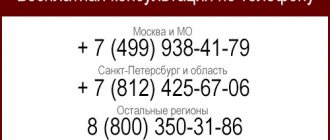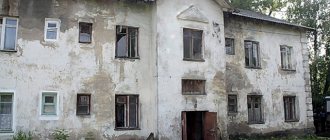In accordance with Part 1 of Article 99 of the Housing Code of the Russian Federation, specialized housing is provided: by decision of the owner of such housing or a state (municipal) body acting on his behalf or a person authorized by it (administration of a state enterprise, command of a military unit, etc.); under contracts hiring specialized residential premises. Thus, housing of this category is provided on two grounds - a decision and an agreement concluded in accordance with this decision. The exception is housing provided for the social protection of certain categories of citizens with whom an agreement for free use is concluded. Based on the meaning of Part 2 of Art. 99 of the Housing Code of the Russian Federation, specialized residential premises cannot be provided to citizens who have housing in the locality where they work, serve, etc., on the right of ownership, social rent, or on other grounds.
Specialized housing
Pravoved.RU 444 lawyers are now on the site
- Civil law
- Ownership
Please tell me! Is it possible to privatize specialized housing for social rent? If so, how can this be done? Is it possible through the court? privatization of housing Collapse Victoria Dymova Support employee Pravoved.ru Similar issues have already been considered, try looking here:
- Privatization of specialized residential premises
- Privatization of service housing
Lawyers' answers (2)
- All legal services in Moscow Challenging the right to an apartment in Moscow from 20,000 rubles. Disputes about ownership of real estate Moscow from 45,000 rubles.
Article 100. Lease agreement for specialized residential premises
Info
The previous Housing Code of the RSFSR provided for a whole list of exceptions to this rule; thus, citizens whose service or work at the enterprise was at least 10 years, as well as single members of the employer’s family with minor children could not be evicted from specialized residential premises. The new Housing Code no longer contains such exceptions.
The legislator thus protects the economic interests of the owners of residential premises, many of which have passed into private hands. However, Federal Law No. 184-FZ “On the entry into force of the Housing Code of the Russian Federation” establishes that citizens who were not subject to eviction according to the previously effective legislation (LC) cannot be evicted from specialized residential premises occupied before March 1, 2005 RSFSR) - if they are or have the right to be on the housing register.
Is it possible to transfer residential premises of a special fund to non-residential premises?
An entrepreneur can open a point on the ground floor. By transferring an apartment to non-residential stock, you can change its target status. Is this possible with premises from a specialized housing stock?
The law clearly limits various types of transactions with special housing. Under a social rental agreement, the tenant cannot sell, mortgage, exchange, or bequeath the apartment. Real estate is at the disposal of the state, local authorities, departments or ministries - depending on which of them is the owner. It is prohibited to remove an object from the housing stock without the consent of the manager . And the local authorities will not give such consent.
The maximum that employers can count on is the subsequent privatization of the premises. However, it is not available for all apartments from the special fund. For example: social housing under a rental agreement is privatized, but service or flexible housing is not.
Considering the specifics of the residential premises of the SZhF, questions may arise during the process.
It is difficult to resolve them without legal literacy. And some of the issues require turning to related sectors: privatization, transfer of housing to non-residential premises, obtaining the status of a needy person, orphan or refugee. If it is difficult for you to take into account all the nuances of a specialized housing stock, use the help of our lawyers. They will answer your questions and give legal advice. Attention!
- Due to frequent changes in legislation, information sometimes becomes outdated faster than we can update it on the website.
- All cases are very individual and depend on many factors. Basic information does not guarantee a solution to your specific problems.
That's why FREE expert consultants work for you around the clock!
- via the form (below), or via online chat
- Call the hotline:
- Moscow and the Region
- St. Petersburg and region
- FREE for a lawyer!
By submitting data you agree to the Consent to PD Processing, PD Processing Policy and User Agreement.
Anonymously
Information about you will not be disclosed
Fast
Fill out the form and a lawyer will contact you within 5 minutes
Tell your friends
Rate ( 1 ratings, average: 5.00 out of 5)
Author of the article
Maxim Privalov
Lawyer. 2 years of experience. I specialize in civil disputes in the field of housing and family law.
Author's rating
Articles written
610
Provision of housing under social rental agreements
The contract is terminated by court in the following cases: failure to pay for residential premises and utilities for more than 6 months; destruction or damage to housing by the tenant or members of his family; systematic violation of the rights and legitimate interests of neighbors; use of residential premises for other purposes. Article 102 of the Housing Code The Russian Federation provides for cases of termination of a rental agreement for specialized residential premises. The contract is terminated due to the loss (destruction) of housing, in the event of the death of a tenant living alone. The rental contract for specialized residential premises is terminated at the end (expiration) of the contract concluded for the period determined by the Housing Code of the Russian Federation (work, service, study, etc.) , i.e.
Model agreement
Special agreement rental is a bilateral agreement between the Landlord and the Tenant , on the basis of which the owner of the premises transfers it to the citizen for use and possession for temporary residence.
Such a document is drawn up in writing, according to the model approved by law. Each type of specialized hiring has its own approved template. All relations under such an agreement are regulated by Articles 100-102 of the Housing Code of the Russian Federation.
Article 102 of the Housing Code of the Russian Federation. Termination of a rental agreement for specialized residential premises
- The rental agreement for specialized residential premises is terminated due to the loss (destruction) of such residential premises or on other grounds provided for by this Code.
- The transfer of ownership of office residential premises or residential premises in a dormitory, as well as the transfer of such residential premises to the economic management or operational management of another legal entity entails the termination of the lease agreement for such residential premises, except in cases where the new owner of such residential premises or legal entity the person to whom such residential premises is transferred is a party to the employment contract with the employee who is the employer of such residential premises.
An object
The subject of a standard agreement is isolated housing (a house, part of a house, apartment, part of an apartment or a room in a dormitory), classified as a specialized housing stock on the basis of the rules specified in the Decree of the Government of the Russian Federation of January 26, 2006 No. 42.
Parties
Special agreement The lease is bilateral and is concluded between the Landlord and the Tenant for a certain period. The person providing the accommodation may be:
- Russian Federation.
- The subject of the Russian Federation.
- Municipality, institution, enterprise.
- Legal entity (usually for official housing).
Rights and obligations
Rights and obligations of the Landlord:
demand full and timely payment for accommodation and utilities (you can find out the legal details of payment under a rental agreement here, and you can find the payment schedule and details of paying rent for an apartment here);- transfer housing for use in proper condition, legally free from the rights and claims of third parties;
- ensure access to public utility services of adequate quality and quantity;
- carry out major repairs;
- be responsible for the maintenance and repair of common property.
Rights and obligations of the Tenant:
- move in and register family members and third parties at the place of residence;
- demand elimination of violations in relation to utilities and common property;
- maintain the allocated living space in a suitable condition for living;
- carry out routine repairs and preventive maintenance;
- pay for housing and utility services on time and in full;
- report the circumstances leading to the termination or modification of the tenancy agreement.
Privatization of specialized housing
Is it possible to privatize it? Federal Law No. 1541-1 provides for the possibility of privatization of social housing by citizens. Moreover, not only the employer, but also registered family members can participate in privatization.
Attention
To carry out privatization, you will need to contact the Housing Department at your place of residence and submit the necessary documents. Within 2-3 months, the documents will be reviewed and a privatization agreement will be concluded with the citizen.
On its basis, you can register ownership of housing. It is also necessary to mention the official housing that various departments provide to their employees.
It is assumed that the citizen lives in such housing until his dismissal. If a person wants to privatize service housing, he will need to first transfer it to the social fund.
Use of housing as SHF premises
The use of housing as premises of the Social Life Fund is allowed only if it is recognized as such and classified as one of the premises of this fund.
It is worth noting that all premises of the SZhF for temporary residence and the Housing Code of the Russian Federation state that under no circumstances these premises can be transferred for rent (the state or municipality provides such premises only under social tenancy agreements) and are not subject to alienation. Article 93 of the Housing Code of the Russian Federation defines the purposes of using the residential premises of the housing estate.
Rental agreement for specialized residential premises
The authorized bodies check the applicant’s compliance with certain criteria and, if the decision is positive, put him in line for housing. When the decision to provide housing is made by federal authorities, the housing is provided from the state fund.
If the decision is made by the municipal authorities, then they allocate housing. For whom is this available? Who is provided with social housing? Citizens who are officially recognized as low-income and in need of improved housing conditions have the right to receive social housing.
Certain categories of citizens have the right to priority provision of housing under a social tenancy agreement.
Rules for classifying residential premises as specialized housing stock
Each type of residential premises has its own rules for classifying them as specialized housing stock. Let's look at these rules in more detail.
Service living quarters
Service residential premises include only individual apartments. Separate rooms in apartments in which other owners and (or) tenants live cannot be service housing. In an apartment building, all or part of the residential premises can be used as service premises.
Only citizens who have labor relations with state authorities, local governments, state or municipal enterprises and institutions can live in the service residential premises of a specialized housing stock.
Residential premises in dormitories
Dormitories include purpose-built or converted houses or parts of houses that have rooms with furniture and other necessary items.
Citizens can temporarily reside in residential premises in dormitories during the period of their work, service or training. There must be at least 6 square meters per person living in a dormitory. m of living space.
So, for example, an employee of a government agency who does not have residential premises at his place of duty and members of his family are provided with official residential premises (when he is transferred to a new duty station in another locality) or residential premises in a dormitory.
Residential premises of the maneuverable fund
Residential premises of the maneuverable stock include premises intended for temporary accommodation:
- citizens living under social rental contracts in houses subject to major repairs;
- citizens whose only living quarters have become uninhabitable as a result of emergency circumstances;
- citizens who have lost their only residential premises acquired through a loan or targeted loan as a result of foreclosure on them.
Residential premises of the flexible fund are provided to citizens at a rate of at least 6 square meters. m of living space per person.
Living quarters in social service buildings
Social service houses include specially constructed or converted buildings, equipped with everything necessary to ensure the life and safety of citizens. They have special premises for carrying out medical, psychological and social activities, as well as labor activities.
These residential premises are inhabited by citizens who are provided with social services and are recognized as needing special social protection.
Residential premises of this type are provided to citizens of these categories under free use agreements.
Residential premises for temporary accommodation of internally displaced persons and refugees
Such premises are under the operational management of the territorial bodies of the Ministry of Internal Affairs of Russia and are provided to internally displaced persons and refugees on a first-come, first-served basis at a rate of no less than 6 square meters. m of living space per person.
Provision of living quarters in rented houses
The rules provided for in Article 65, parts 3 and 4 of Article 67 and Article 69 of this Code apply to the use of specialized residential premises under lease agreements for such premises, with the exception of the use of service residential premises, for the use of which under lease agreements for such premises the rules provided for in parts apply 2 - 4 of Article 31, Article 65 and parts 3 and 4 of Article 67 of this Code, unless otherwise established by other federal laws. (as amended by Federal Law No. 182-FZ of June 28, 2014) (see text in the previous edition) 6. The lease agreement for specialized residential premises specifies the family members of the tenant. 7. The rental agreement for specialized residential premises is concluded in writing. 8. Standard rental agreements for specialized residential premises are approved by the Government of the Russian Federation. (edited)
Provision of social housing premises
The order to provide housing for rent to citizens is adopted by the authorized institution in whose department a specific housing stock is located. Apartments are allocated for people who need improved conditions or increased living space.
Those in need must first submit papers to register and get in line to receive a housing warrant. This is done on the basis of an application and attaching the necessary certificates and acts to it. In particular, it is required:
- the applicant's general passport;
- certificate of family composition;
- certificates of marriage, birth of children;
- income certificate in form 2-NDFL;
- a copy of the work book.
This is not an exhaustive list. Depending on the situation, it may vary and be supplemented. For example, if the applicant has a dependent disabled person, you will need to provide a medical certificate about this.
To receive social housing, you must meet the following criteria:
- have the status of those in need of housing, obtained within the framework of the prescribed procedure;
- family income should not be higher than the maximum limited by municipal acts for the possibility of occupying social housing.
Based on the application and the papers attached to it, a document is accepted on the move-in of a person and his immediate relatives into a free social housing space. In addition to the order, a warrant is issued. It is the fundamental document for drawing up a tenancy agreement for social residential premises.










